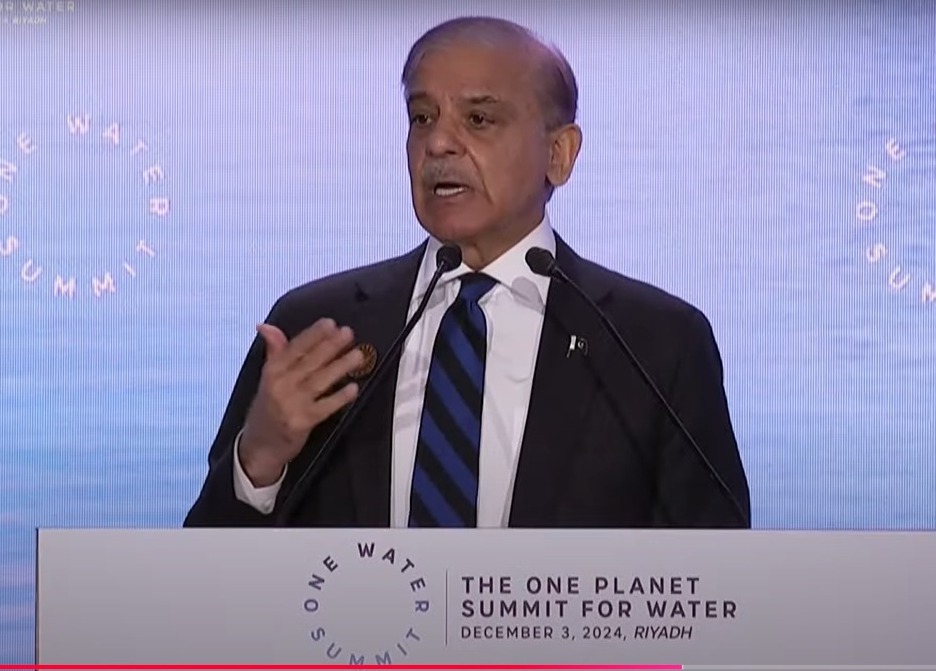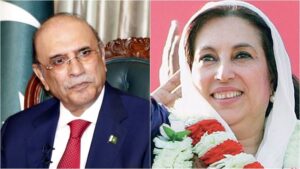PM Shehbaz Sharif Calls for Global Leadership to Tackle Water Crisis at UNCCD One Water Summit

Riyadh, The Gulf Observer: Prime Minister Muhammad Shehbaz Sharif on Tuesday underscored the urgent need for strong political will and global leadership to address the escalating water crisis, which poses an existential threat to nations worldwide. Speaking at the One Water Summit on the margins of the United Nations Convention to Combat Desertification (UNCCD COP-16), the prime minister stressed the importance of collective action to ensure water security.
The summit, themed “Restore, Preserve, and Adapt”, was organized with the support of Saudi Arabia, France, Kazakhstan, and the World Bank. Prime Minister Shehbaz extended his gratitude to these nations and institutions for convening this vital dialogue.
He highlighted that water is the lifeblood of the planet, essential for economic development, food security, and environmental sustainability. However, the resource is under immense stress, with nearly half of the global population experiencing water scarcity and billions lacking access to clean drinking water.
The prime minister warned of the dire consequences of depleting and degrading water resources, noting that this crisis is displacing millions and causing unprecedented destruction. “This is not a distant threat but an alarm bell for collective action,” he remarked.
Pakistan’s Water Challenges
Shehbaz Sharif drew attention to Pakistan’s vulnerability to climate-induced water challenges, exacerbated by population growth and environmental changes. The catastrophic floods of 2022 devastated Pakistan’s water resources and irrigation sector, impacting millions of lives. Concurrently, drought conditions threaten 30% of the population, with 70% of the country’s land consisting of arid and semi-arid areas.
Projected temperature increases in Pakistan are significantly higher than the global average, making the country one of the ten most climate-vulnerable nations.
Call for International Cooperation
The prime minister emphasized the importance of transboundary water cooperation, citing the Indus Water Treaty as a critical mechanism for regional peace and stability. However, he noted that recent challenges, such as upstream dam construction, have strained the treaty.
Shehbaz Sharif also highlighted Pakistan’s initiatives, including the ‘Recharge Pakistan’ program to mitigate climate-induced flood risks and the upcoming ‘National Drought Plan’ to address drought impacts effectively.
A Six-Point Global Agenda
The prime minister proposed a six-point agenda for global water security:
- Strengthen international cooperation to achieve SDG-6 on water and sanitation.
- Promote knowledge-sharing and technology transfer for innovative water management.
- Address funding gaps for climate-resilient infrastructure.
- Develop frameworks for transparency, data sharing, and regional cooperation to avoid conflicts.
- Invest in skills development, research, and institutional strengthening.
- Foster political will and leadership to tackle the water crisis collectively.
Global Water Organization
Prime Minister Shehbaz praised the leadership of Saudi Crown Prince Mohammad bin Salman for establishing the Global Water Organization and affirmed Pakistan’s commitment as a founding member to its objectives.
Concluding his address, Shehbaz Sharif reflected on cherished memories of Pakistan’s rivers and the livelihoods they sustained, urging leaders to preserve these vital resources for future generations. “It is our duty to ensure that rivers, lakes, and aquifers that nourished civilizations for centuries must not become tales of the past,” he said.


